The Business of Intelligence: Analyzing Cyber Technology's Influence
VerifiedAdded on 2023/03/31
|7
|1184
|365
Essay
AI Summary
This essay delves into the transformative impact of the internet revolution and cyber technology on the business of intelligence. It explores how cyberspace and cyber technology have become central to data analysis and decision-making, examining the shift from traditional warfare to cyber weapons. The essay discusses the challenges of cybersecurity, including data breaches and the misuse of information, referencing examples like the 2016 US elections and the Facebook data scandal. It also highlights the opportunities created by the technology industry, such as job creation and the development of billion-dollar companies. The conclusion emphasizes the ongoing evolution of the business of intelligence and the importance of addressing the challenges presented by the digital age.
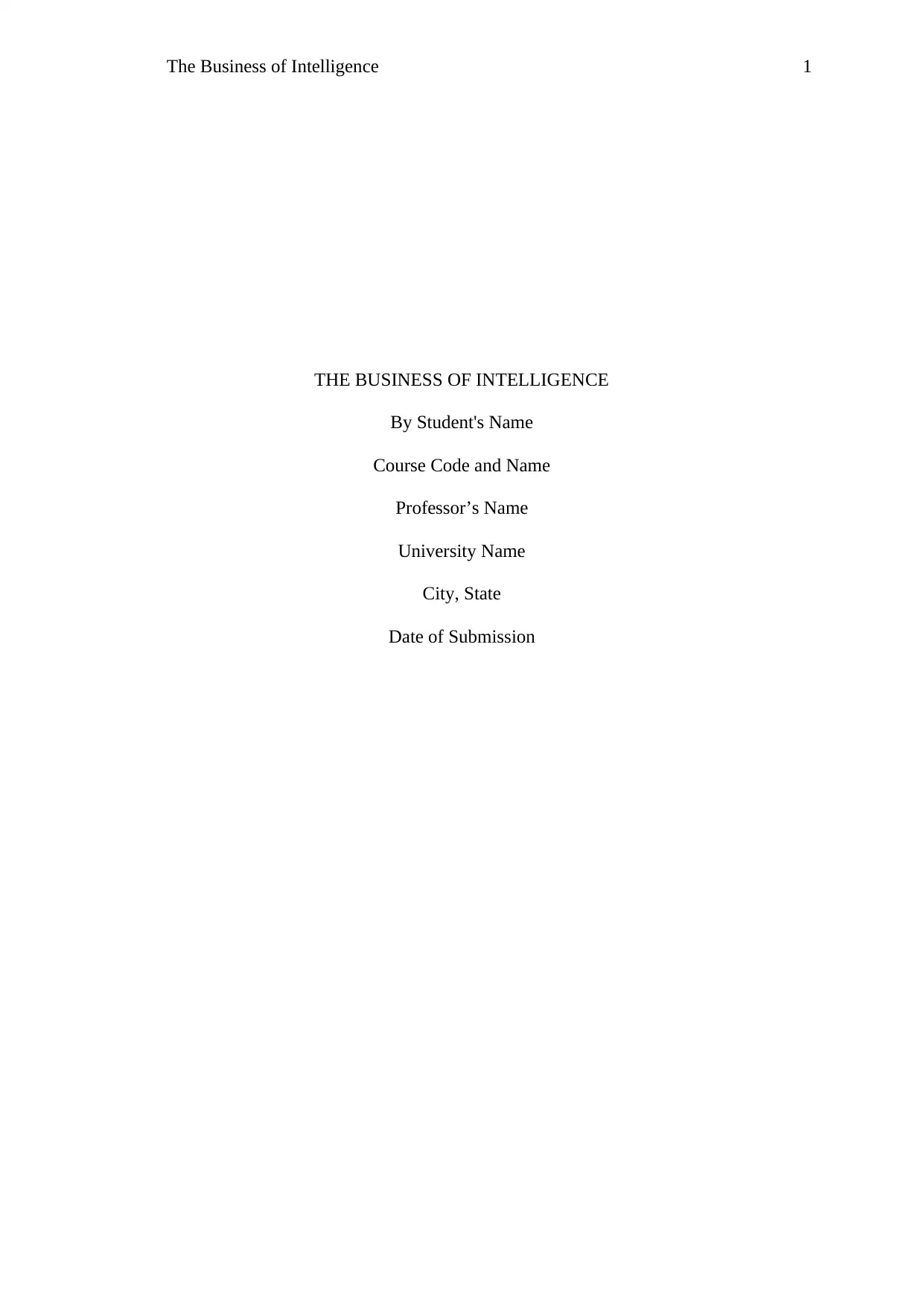
The Business of Intelligence 1
THE BUSINESS OF INTELLIGENCE
By Student's Name
Course Code and Name
Professor’s Name
University Name
City, State
Date of Submission
THE BUSINESS OF INTELLIGENCE
By Student's Name
Course Code and Name
Professor’s Name
University Name
City, State
Date of Submission
Paraphrase This Document
Need a fresh take? Get an instant paraphrase of this document with our AI Paraphraser
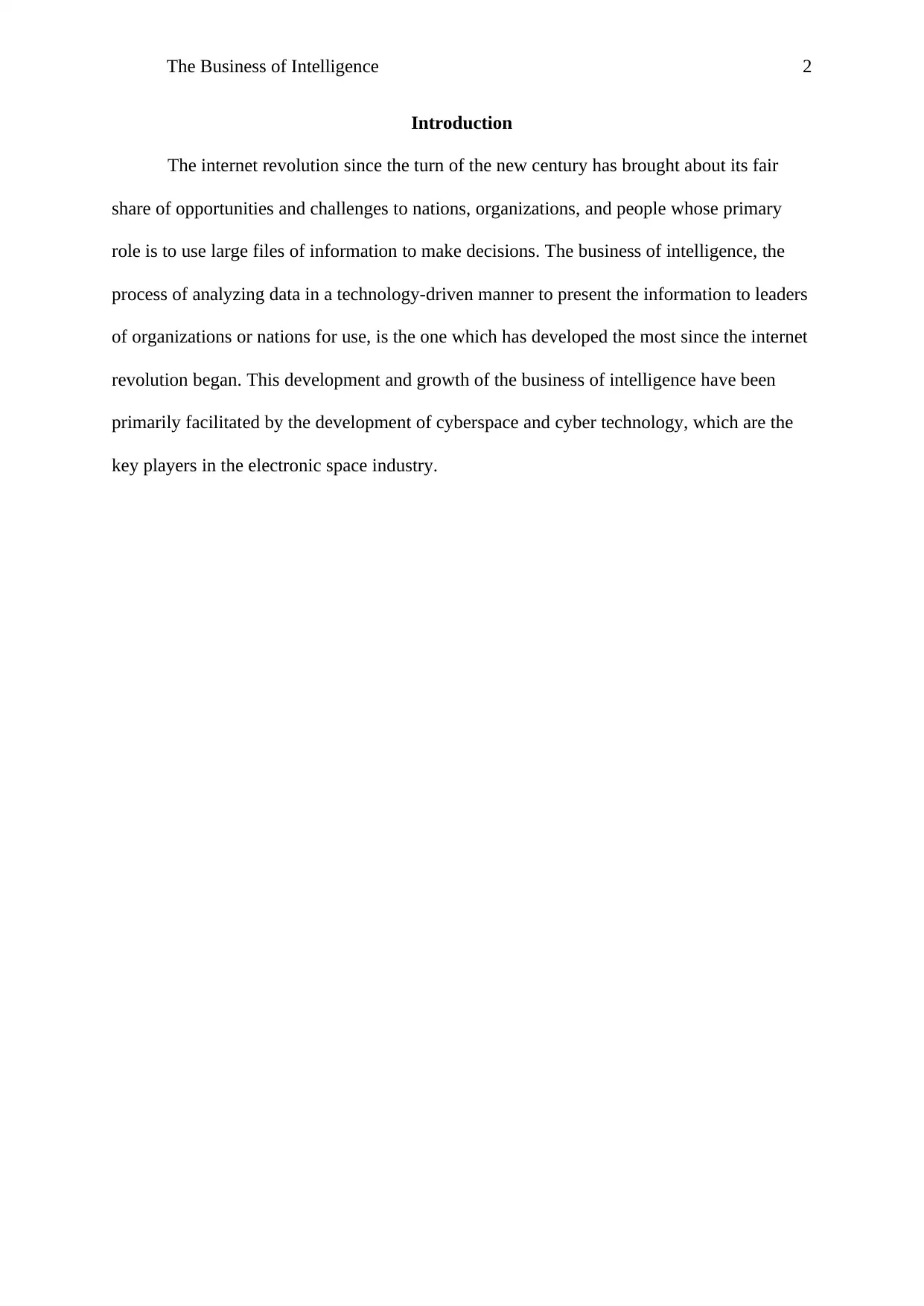
The Business of Intelligence 2
Introduction
The internet revolution since the turn of the new century has brought about its fair
share of opportunities and challenges to nations, organizations, and people whose primary
role is to use large files of information to make decisions. The business of intelligence, the
process of analyzing data in a technology-driven manner to present the information to leaders
of organizations or nations for use, is the one which has developed the most since the internet
revolution began. This development and growth of the business of intelligence have been
primarily facilitated by the development of cyberspace and cyber technology, which are the
key players in the electronic space industry.
Introduction
The internet revolution since the turn of the new century has brought about its fair
share of opportunities and challenges to nations, organizations, and people whose primary
role is to use large files of information to make decisions. The business of intelligence, the
process of analyzing data in a technology-driven manner to present the information to leaders
of organizations or nations for use, is the one which has developed the most since the internet
revolution began. This development and growth of the business of intelligence have been
primarily facilitated by the development of cyberspace and cyber technology, which are the
key players in the electronic space industry.
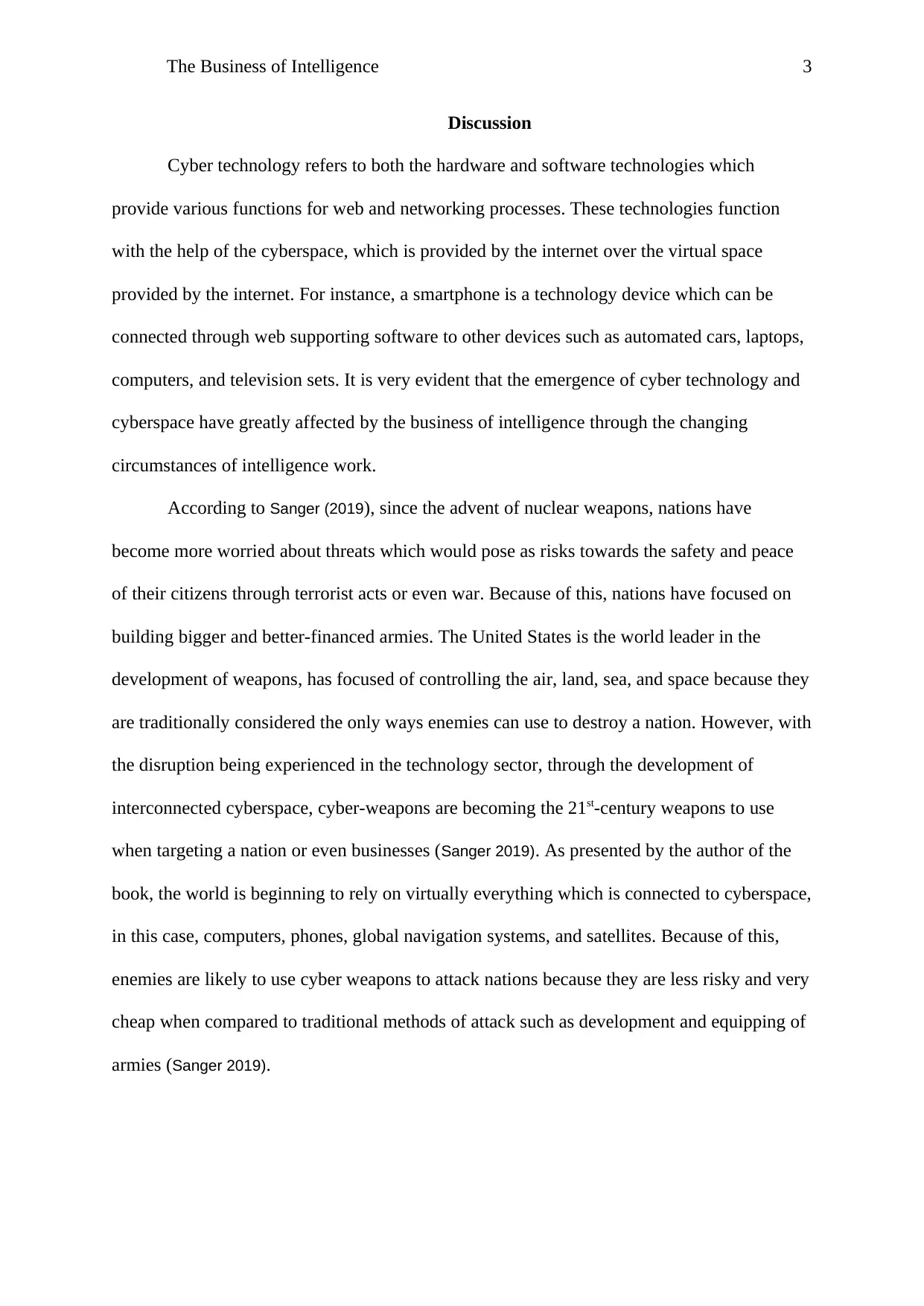
The Business of Intelligence 3
Discussion
Cyber technology refers to both the hardware and software technologies which
provide various functions for web and networking processes. These technologies function
with the help of the cyberspace, which is provided by the internet over the virtual space
provided by the internet. For instance, a smartphone is a technology device which can be
connected through web supporting software to other devices such as automated cars, laptops,
computers, and television sets. It is very evident that the emergence of cyber technology and
cyberspace have greatly affected by the business of intelligence through the changing
circumstances of intelligence work.
According to Sanger (2019), since the advent of nuclear weapons, nations have
become more worried about threats which would pose as risks towards the safety and peace
of their citizens through terrorist acts or even war. Because of this, nations have focused on
building bigger and better-financed armies. The United States is the world leader in the
development of weapons, has focused of controlling the air, land, sea, and space because they
are traditionally considered the only ways enemies can use to destroy a nation. However, with
the disruption being experienced in the technology sector, through the development of
interconnected cyberspace, cyber-weapons are becoming the 21st-century weapons to use
when targeting a nation or even businesses (Sanger 2019). As presented by the author of the
book, the world is beginning to rely on virtually everything which is connected to cyberspace,
in this case, computers, phones, global navigation systems, and satellites. Because of this,
enemies are likely to use cyber weapons to attack nations because they are less risky and very
cheap when compared to traditional methods of attack such as development and equipping of
armies (Sanger 2019).
Discussion
Cyber technology refers to both the hardware and software technologies which
provide various functions for web and networking processes. These technologies function
with the help of the cyberspace, which is provided by the internet over the virtual space
provided by the internet. For instance, a smartphone is a technology device which can be
connected through web supporting software to other devices such as automated cars, laptops,
computers, and television sets. It is very evident that the emergence of cyber technology and
cyberspace have greatly affected by the business of intelligence through the changing
circumstances of intelligence work.
According to Sanger (2019), since the advent of nuclear weapons, nations have
become more worried about threats which would pose as risks towards the safety and peace
of their citizens through terrorist acts or even war. Because of this, nations have focused on
building bigger and better-financed armies. The United States is the world leader in the
development of weapons, has focused of controlling the air, land, sea, and space because they
are traditionally considered the only ways enemies can use to destroy a nation. However, with
the disruption being experienced in the technology sector, through the development of
interconnected cyberspace, cyber-weapons are becoming the 21st-century weapons to use
when targeting a nation or even businesses (Sanger 2019). As presented by the author of the
book, the world is beginning to rely on virtually everything which is connected to cyberspace,
in this case, computers, phones, global navigation systems, and satellites. Because of this,
enemies are likely to use cyber weapons to attack nations because they are less risky and very
cheap when compared to traditional methods of attack such as development and equipping of
armies (Sanger 2019).
⊘ This is a preview!⊘
Do you want full access?
Subscribe today to unlock all pages.

Trusted by 1+ million students worldwide
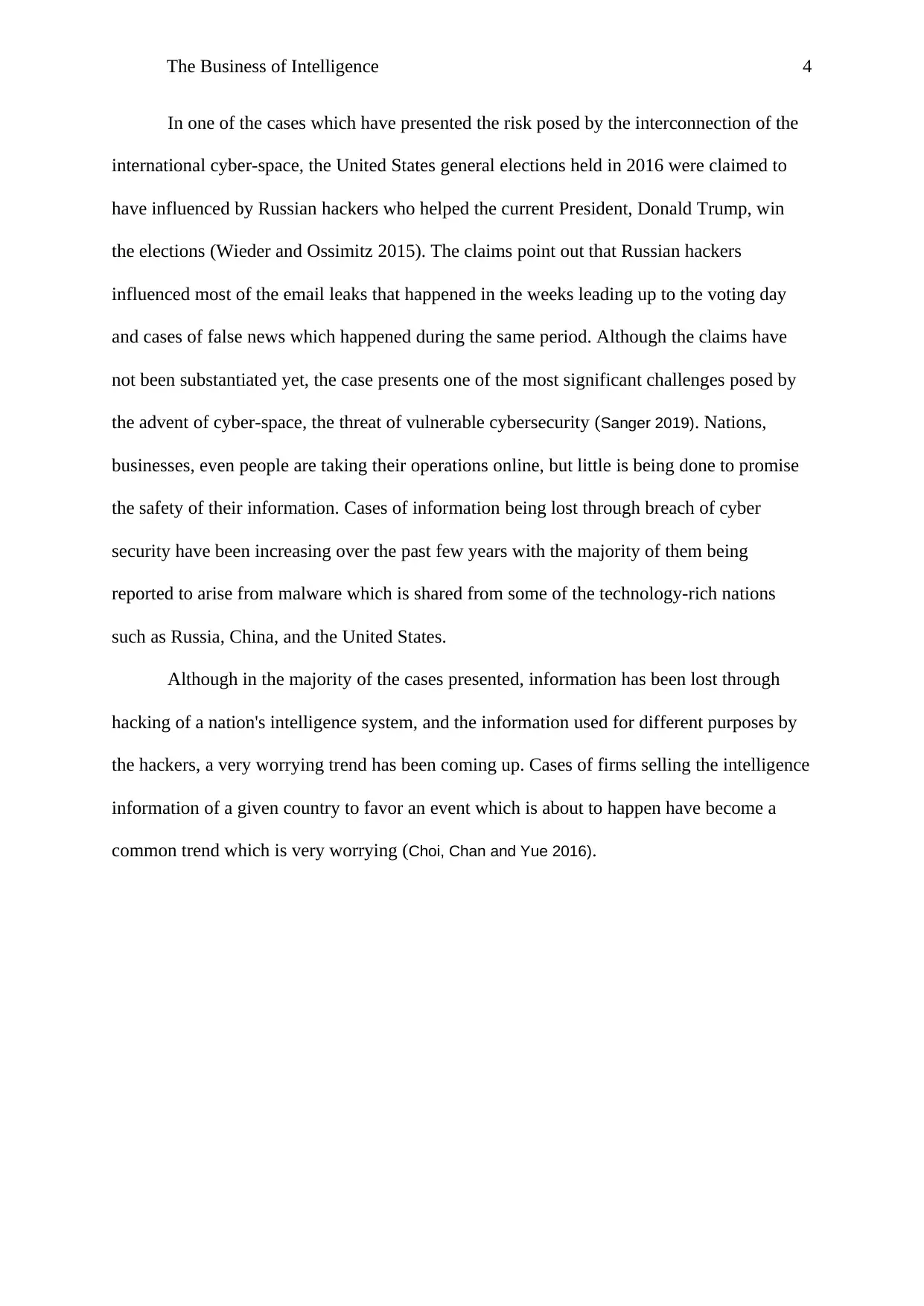
The Business of Intelligence 4
In one of the cases which have presented the risk posed by the interconnection of the
international cyber-space, the United States general elections held in 2016 were claimed to
have influenced by Russian hackers who helped the current President, Donald Trump, win
the elections (Wieder and Ossimitz 2015). The claims point out that Russian hackers
influenced most of the email leaks that happened in the weeks leading up to the voting day
and cases of false news which happened during the same period. Although the claims have
not been substantiated yet, the case presents one of the most significant challenges posed by
the advent of cyber-space, the threat of vulnerable cybersecurity (Sanger 2019). Nations,
businesses, even people are taking their operations online, but little is being done to promise
the safety of their information. Cases of information being lost through breach of cyber
security have been increasing over the past few years with the majority of them being
reported to arise from malware which is shared from some of the technology-rich nations
such as Russia, China, and the United States.
Although in the majority of the cases presented, information has been lost through
hacking of a nation's intelligence system, and the information used for different purposes by
the hackers, a very worrying trend has been coming up. Cases of firms selling the intelligence
information of a given country to favor an event which is about to happen have become a
common trend which is very worrying (Choi, Chan and Yue 2016).
In one of the cases which have presented the risk posed by the interconnection of the
international cyber-space, the United States general elections held in 2016 were claimed to
have influenced by Russian hackers who helped the current President, Donald Trump, win
the elections (Wieder and Ossimitz 2015). The claims point out that Russian hackers
influenced most of the email leaks that happened in the weeks leading up to the voting day
and cases of false news which happened during the same period. Although the claims have
not been substantiated yet, the case presents one of the most significant challenges posed by
the advent of cyber-space, the threat of vulnerable cybersecurity (Sanger 2019). Nations,
businesses, even people are taking their operations online, but little is being done to promise
the safety of their information. Cases of information being lost through breach of cyber
security have been increasing over the past few years with the majority of them being
reported to arise from malware which is shared from some of the technology-rich nations
such as Russia, China, and the United States.
Although in the majority of the cases presented, information has been lost through
hacking of a nation's intelligence system, and the information used for different purposes by
the hackers, a very worrying trend has been coming up. Cases of firms selling the intelligence
information of a given country to favor an event which is about to happen have become a
common trend which is very worrying (Choi, Chan and Yue 2016).
Paraphrase This Document
Need a fresh take? Get an instant paraphrase of this document with our AI Paraphraser
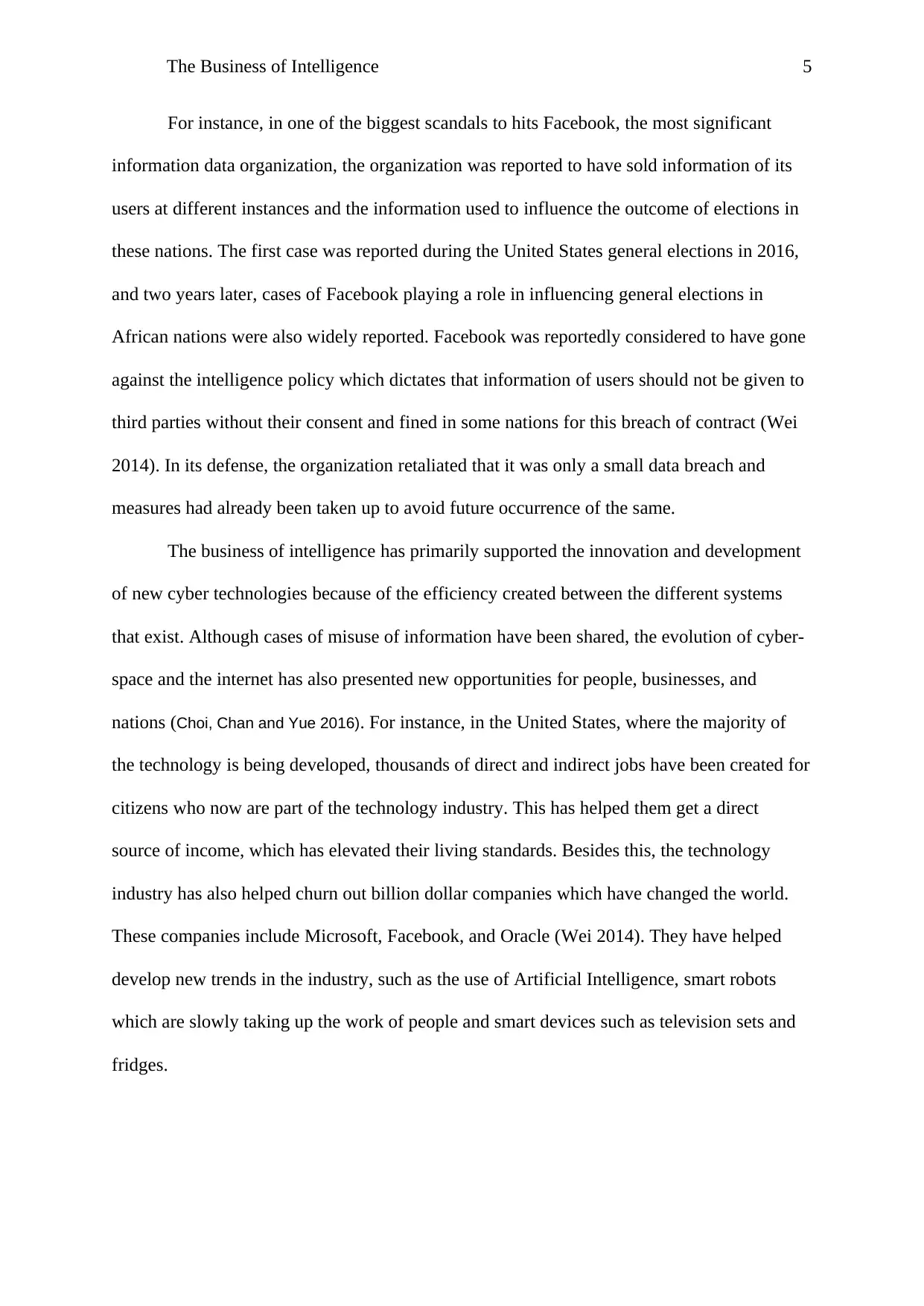
The Business of Intelligence 5
For instance, in one of the biggest scandals to hits Facebook, the most significant
information data organization, the organization was reported to have sold information of its
users at different instances and the information used to influence the outcome of elections in
these nations. The first case was reported during the United States general elections in 2016,
and two years later, cases of Facebook playing a role in influencing general elections in
African nations were also widely reported. Facebook was reportedly considered to have gone
against the intelligence policy which dictates that information of users should not be given to
third parties without their consent and fined in some nations for this breach of contract (Wei
2014). In its defense, the organization retaliated that it was only a small data breach and
measures had already been taken up to avoid future occurrence of the same.
The business of intelligence has primarily supported the innovation and development
of new cyber technologies because of the efficiency created between the different systems
that exist. Although cases of misuse of information have been shared, the evolution of cyber-
space and the internet has also presented new opportunities for people, businesses, and
nations (Choi, Chan and Yue 2016). For instance, in the United States, where the majority of
the technology is being developed, thousands of direct and indirect jobs have been created for
citizens who now are part of the technology industry. This has helped them get a direct
source of income, which has elevated their living standards. Besides this, the technology
industry has also helped churn out billion dollar companies which have changed the world.
These companies include Microsoft, Facebook, and Oracle (Wei 2014). They have helped
develop new trends in the industry, such as the use of Artificial Intelligence, smart robots
which are slowly taking up the work of people and smart devices such as television sets and
fridges.
For instance, in one of the biggest scandals to hits Facebook, the most significant
information data organization, the organization was reported to have sold information of its
users at different instances and the information used to influence the outcome of elections in
these nations. The first case was reported during the United States general elections in 2016,
and two years later, cases of Facebook playing a role in influencing general elections in
African nations were also widely reported. Facebook was reportedly considered to have gone
against the intelligence policy which dictates that information of users should not be given to
third parties without their consent and fined in some nations for this breach of contract (Wei
2014). In its defense, the organization retaliated that it was only a small data breach and
measures had already been taken up to avoid future occurrence of the same.
The business of intelligence has primarily supported the innovation and development
of new cyber technologies because of the efficiency created between the different systems
that exist. Although cases of misuse of information have been shared, the evolution of cyber-
space and the internet has also presented new opportunities for people, businesses, and
nations (Choi, Chan and Yue 2016). For instance, in the United States, where the majority of
the technology is being developed, thousands of direct and indirect jobs have been created for
citizens who now are part of the technology industry. This has helped them get a direct
source of income, which has elevated their living standards. Besides this, the technology
industry has also helped churn out billion dollar companies which have changed the world.
These companies include Microsoft, Facebook, and Oracle (Wei 2014). They have helped
develop new trends in the industry, such as the use of Artificial Intelligence, smart robots
which are slowly taking up the work of people and smart devices such as television sets and
fridges.
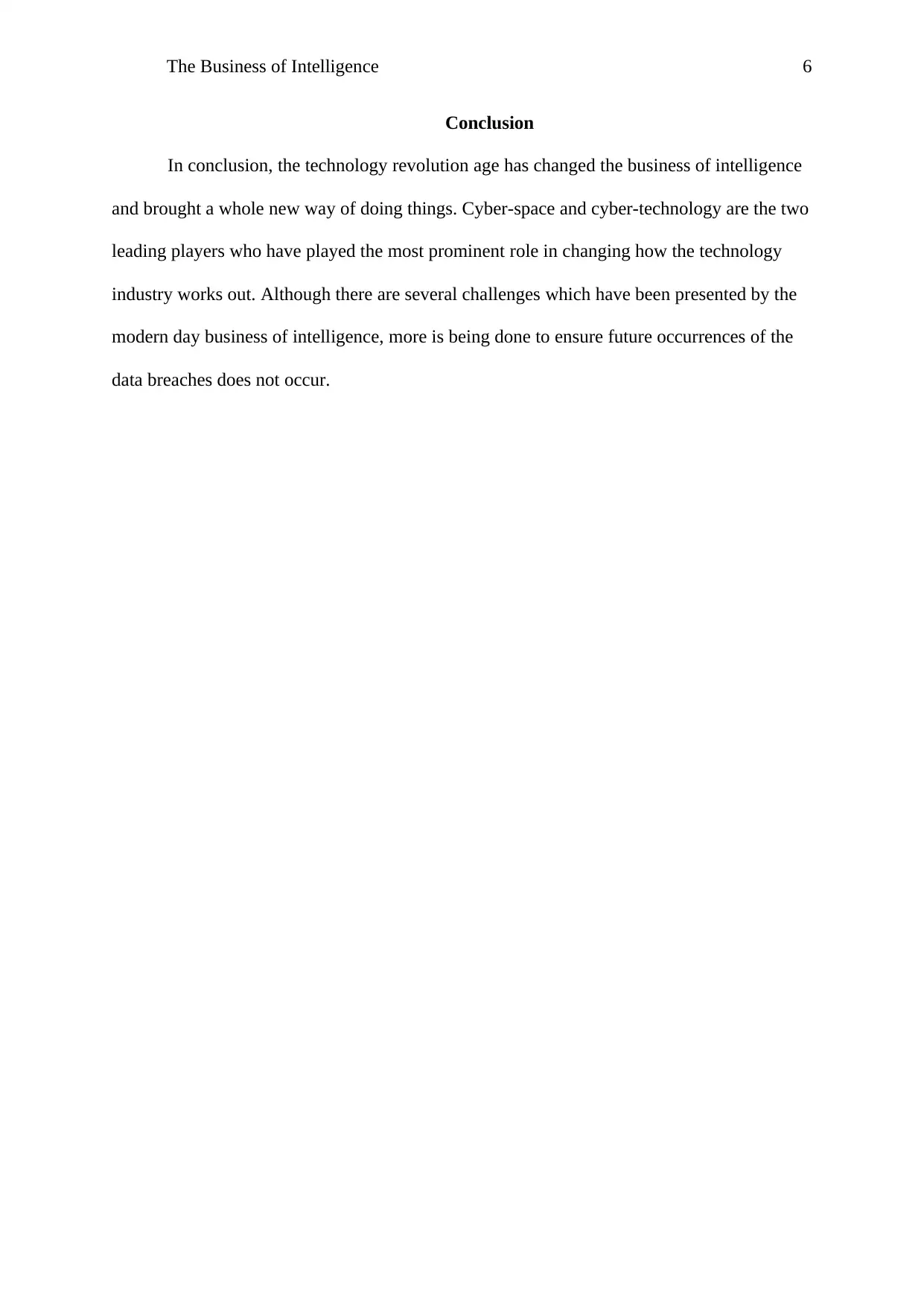
The Business of Intelligence 6
Conclusion
In conclusion, the technology revolution age has changed the business of intelligence
and brought a whole new way of doing things. Cyber-space and cyber-technology are the two
leading players who have played the most prominent role in changing how the technology
industry works out. Although there are several challenges which have been presented by the
modern day business of intelligence, more is being done to ensure future occurrences of the
data breaches does not occur.
Conclusion
In conclusion, the technology revolution age has changed the business of intelligence
and brought a whole new way of doing things. Cyber-space and cyber-technology are the two
leading players who have played the most prominent role in changing how the technology
industry works out. Although there are several challenges which have been presented by the
modern day business of intelligence, more is being done to ensure future occurrences of the
data breaches does not occur.
⊘ This is a preview!⊘
Do you want full access?
Subscribe today to unlock all pages.

Trusted by 1+ million students worldwide
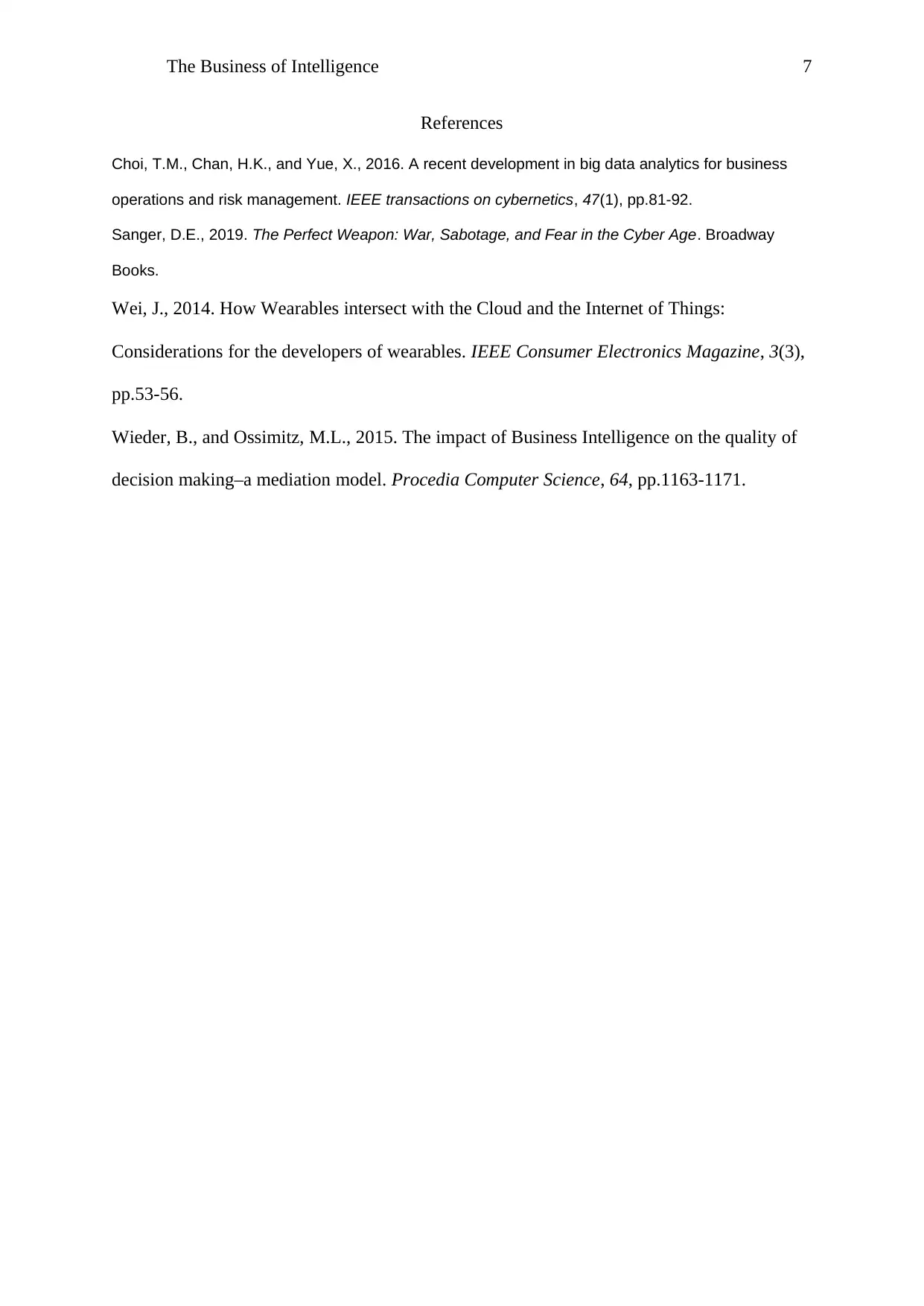
The Business of Intelligence 7
References
Choi, T.M., Chan, H.K., and Yue, X., 2016. A recent development in big data analytics for business
operations and risk management. IEEE transactions on cybernetics, 47(1), pp.81-92.
Sanger, D.E., 2019. The Perfect Weapon: War, Sabotage, and Fear in the Cyber Age. Broadway
Books.
Wei, J., 2014. How Wearables intersect with the Cloud and the Internet of Things:
Considerations for the developers of wearables. IEEE Consumer Electronics Magazine, 3(3),
pp.53-56.
Wieder, B., and Ossimitz, M.L., 2015. The impact of Business Intelligence on the quality of
decision making–a mediation model. Procedia Computer Science, 64, pp.1163-1171.
References
Choi, T.M., Chan, H.K., and Yue, X., 2016. A recent development in big data analytics for business
operations and risk management. IEEE transactions on cybernetics, 47(1), pp.81-92.
Sanger, D.E., 2019. The Perfect Weapon: War, Sabotage, and Fear in the Cyber Age. Broadway
Books.
Wei, J., 2014. How Wearables intersect with the Cloud and the Internet of Things:
Considerations for the developers of wearables. IEEE Consumer Electronics Magazine, 3(3),
pp.53-56.
Wieder, B., and Ossimitz, M.L., 2015. The impact of Business Intelligence on the quality of
decision making–a mediation model. Procedia Computer Science, 64, pp.1163-1171.
1 out of 7
Related Documents
Your All-in-One AI-Powered Toolkit for Academic Success.
+13062052269
info@desklib.com
Available 24*7 on WhatsApp / Email
![[object Object]](/_next/static/media/star-bottom.7253800d.svg)
Unlock your academic potential
Copyright © 2020–2025 A2Z Services. All Rights Reserved. Developed and managed by ZUCOL.





